Budgies, also known as parakeets, are delightful and popular pet birds known for their vibrant colours and playful personalities. These small, intelligent creatures possess a flight instinct, an essential aspect of their well-being.
However, as a budgie owner, you may have noticed that your feathered friend faces difficulty flying correctly. This raises the question: what could be the reasons behind your budgie’s inability to fly as expected?
Understanding the factors contributing to this problem is crucial to provide the necessary care and support for your budgie’s health and happiness.
In this article, we will delve into the world of budgies, exploring their characteristics, the importance of flight for their overall well-being, and the potential reasons behind their flight limitations.
By gaining insight into these factors, you will be equipped with the knowledge to help your budgie regain its flying prowess and lead a fulfilling life.
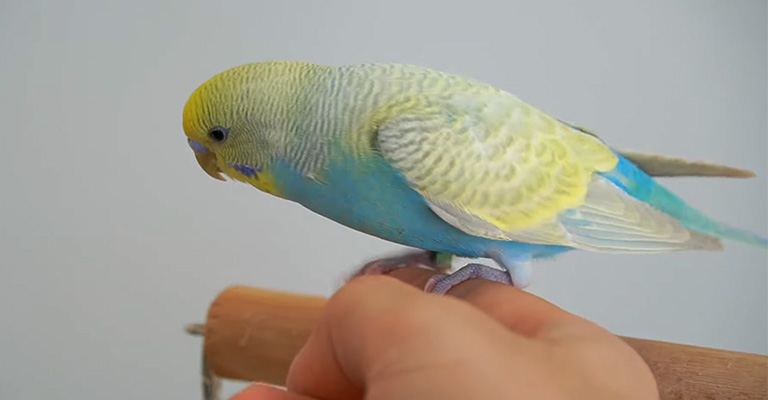
Why Can’t My Budgie Fly Properly?
Understanding the reasons behind your budgie’s inability to fly correctly is essential for addressing the issue effectively and providing the necessary care. Several factors can contribute to flight difficulties in budgies, ranging from physical health issues to psychological factors.
Physical Health And Medical Issues:
Wing Injuries or Deformities
Budgies may experience wing injuries from accidents, improper handling, or collisions with objects. Fractured or misaligned wings can significantly hinder their ability to fly. Similarly, congenital deformities or malformations may restrict wing movement, affecting flight.
Obesity and Its Impact on Flight Ability
Poor diet, overfeeding, and lack of exercise can lead to obesity in budgies. Excess weight strains their wings and muscles, making it difficult for them to achieve and sustain flight.
Respiratory Problems Affecting Breathing and Flight
Budgies suffering from respiratory conditions such as infections or lung diseases may struggle with breathing, which can impede their ability to fly. Laboured breathing limits their endurance and may result in reduced flight capacity.
Psychological Factors:
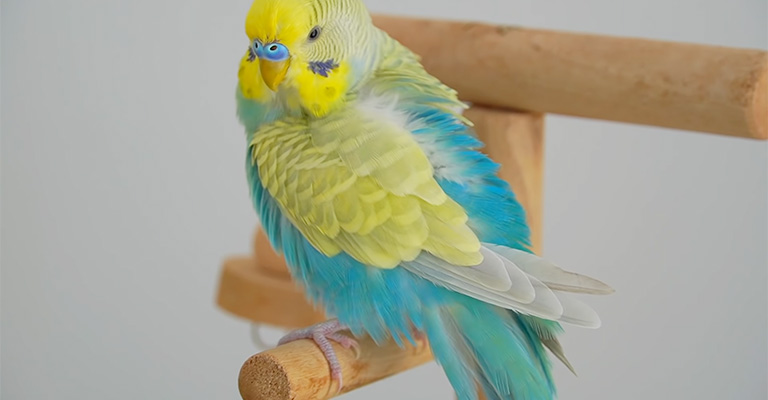
Stress and Anxiety Hindering Flight
Budgies are sensitive creatures and stressful environments or situations can significantly impact their flight behaviour. Loud noises, frequent disturbances, or even the presence of aggressive cage mates can induce stress, causing a budgie to become reluctant to fly.
Traumatic Experiences Affecting Confidence in Flight
Previous traumatic experiences, such as being chased by a predator or experiencing a fall, can create fear and diminish a budgie’s confidence in flying. This lack of confidence may lead to hesitation or avoidance of flight altogether.
Behavioural Issues and Their Impact on Flying Behaviour
Budgies with behavioural problems like excessive aggression, territoriality, or self-mutilation tendencies may exhibit abnormal flying behaviour.
These issues can stem from inadequate socialization, improper training, or underlying health conditions, further impacting their ability to fly correctly.
How Can I Assess My Budgie’s Flight Ability?
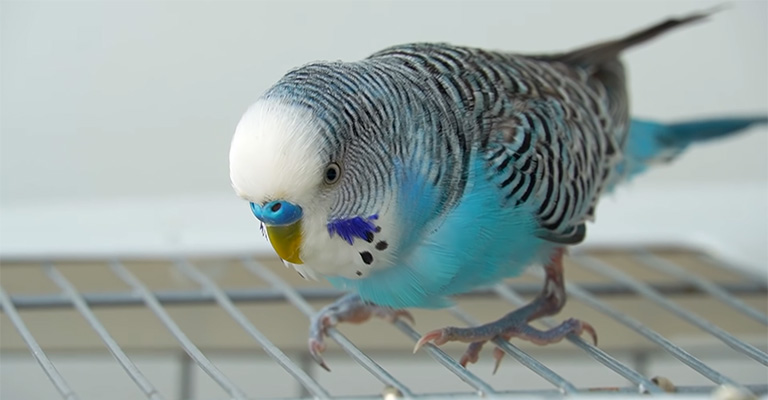
Assessing your budgie’s flight ability is crucial to understand the extent of their limitations and identify any underlying issues affecting their mobility. Here are several methods you can employ to evaluate your budgie’s flight ability:
Observational Techniques
Observe your budgie’s flight patterns and behaviour within its living space. Take note of any irregularities, such as difficulty maintaining altitude, frequent crashes, or hesitance to take off.
Consulting With A Veterinarian
Seeking professional advice from an avian veterinarian is essential. They can conduct a thorough physical examination, including assessing wing structure, muscle tone, and overall health, to determine any underlying medical conditions affecting your budgie’s flight.
Identifying Behavioural Cues And Signs Of Discomfort
Pay attention to your budgie’s body language and behaviour while attempting to fly. Look for signs of distress, such as fluffed-up feathers, laboured breathing, or favouring one wing.
Behavioural cues, like excessive vocalization or reluctance to leave their perch, can also indicate flight-related issues.
When Should I Be Concerned About My Budgie’s Inability To Fly?
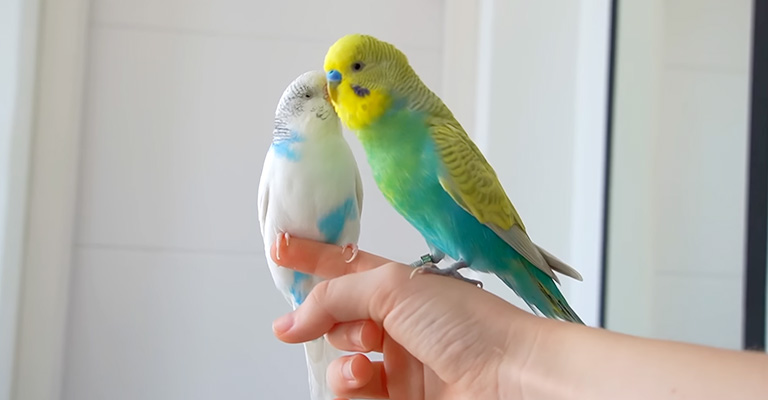
As a responsible budgie owner, knowing when your feathered companion’s inability to fly requires attention and care is crucial. Differentiating between temporary and persistent flight issues will help you gauge the seriousness of the situation.
Suppose your budgie experiences a minor wing injury or seems disoriented after a sudden scare. In that case, it might be a temporary setback.
However, if your budgie consistently struggles to fly or exhibits abnormal flight patterns, it could indicate underlying health or behavioural problems that require immediate evaluation by an avian veterinarian.
Differentiating Between Temporary And Persistent Flight Issues
Temporary flight issues may arise due to minor injuries, stress, or a new environment. These situations often resolve with rest and gentle care.
Persistent matters, on the other hand, manifest as ongoing difficulties in launching or maintaining flight and may suggest serious health problems.
Understanding Normal Behaviour Versus Abnormal Flight Patterns
Normal flight behaviour in budgies involves confident, steady, and coordinated flying. They should be able to take off effortlessly, glide smoothly, and land gracefully.
Abnormal patterns include frequent crashes, disoriented flight, excessive flapping, or avoidance of flying altogether.
Such behaviours can indicate potential medical issues or psychological distress that necessitates intervention.
What Steps Can I Take To Help My Budgie Fly Better?
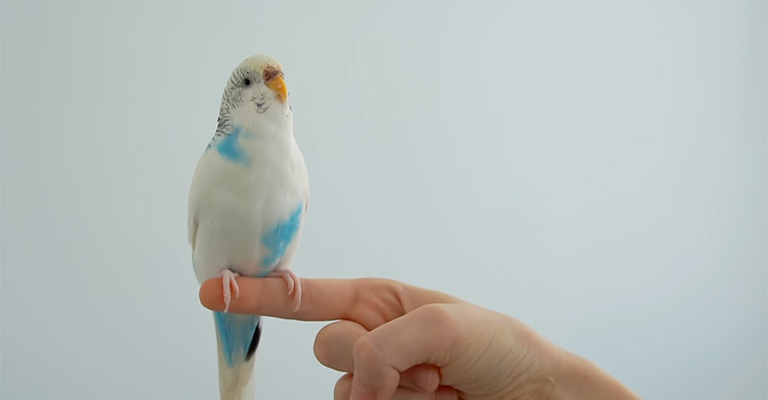
Providing a suitable living environment, ensuring proper nutrition, engaging in exercise and training, and reducing stress and anxiety are crucial in helping your budgie regain its flying abilities.
By taking these proactive steps, you can create an environment that promotes physical health, encourages movement, and instils confidence in your budgie’s flying capabilities.
Providing A Suitable Living Environment
To facilitate your budgie’s flight, optimize its cage setup and placement. Ensure the cage is spacious enough to allow for flying exercises and extending wings without obstruction. Place the cage in an area with ample natural light away from drafty locations.
Additionally, incorporate stimulating toys and perches within the cage to encourage movement. Budgies enjoy climbing, perching, and playing with toys, which can help strengthen their flight muscles.
Nutritional Considerations For Optimal Health
A well-balanced diet is essential for your budgie’s overall health and, consequently, its ability to fly. Provide a varied and nutritionally complete diet of fresh fruits, vegetables, high-quality pellets, and seeds.
Monitoring portion control and avoiding overfeeding is crucial, as obesity can significantly hinder flight ability. Treats should be given sparingly, as they can contribute to weight gain. Maintaining a healthy weight is essential for budgies to achieve optimal flight capabilities.
Exercise And Training Techniques
Engaging your budgie in gentle flight exercises and routines can strengthen its flight muscles and improve coordination. Create a safe space outside the cage, such as a designated play area, where your budgie can practice short flights.
Gradually increase the distance and height of these exercises as your budgie gains confidence and improves its flying skills. Positive reinforcement, such as offering treats and verbal praise, can encourage your budgie to engage in flight training and build confidence.
Reducing Stress And Anxiety Factors
Stress and anxiety can significantly impact a budgie’s ability to fly comfortably. Identify potential stressors in your budgie’s environment, such as loud noises, excessive handling, or predators (including other pets).
Minimize these stressors as much as possible to create a calming atmosphere. Provide hiding spots, such as bird-safe foliage or cosy areas within the cage, where your budgie can retreat when feeling anxious.
Consider using calming techniques like soothing music or diffusing calming essential oils to create a serene atmosphere.
Where Can I Seek Professional Help For My Budgie?
If your budgie faces difficulties with flying or exhibiting behavioural issues, seeking professional assistance is vital to ensure its well-being. Professional help can provide expert insights, diagnoses, and tailored solutions to address your budgie’s needs and challenges.
Choosing The Right Avian Veterinarian:
When your budgie’s health is at stake, consulting an experienced avian veterinarian is the first step. Not all veterinarians specialize in treating birds, so it’s crucial to find one with expertise in avian care.
An avian veterinarian will conduct thorough examinations, including X-rays and blood tests, to identify any underlying medical conditions that may affect your budgie’s ability to fly. They can also recommend appropriate treatments or therapies to aid in your budgie’s recovery.
Seeking Assistance From A Certified Bird Behaviourist Or Trainer:
If your budgie is experiencing behavioural issues that may hinder its ability to fly, enlisting the help of a certified bird behaviourist or trainer can make a significant difference. These professionals have in-depth knowledge of bird behaviour and psychology.
They can work closely with you and your budgie to identify and address any emotional or behavioural challenges.
They can provide valuable guidance on environmental enrichment, socialization techniques, and positive reinforcement methods to encourage your budgie’s flight and overall well-being.
Frequently Asked Questions
A clipped budgie’s feathers typically regrow within a few months. However, the exact timeframe can vary depending on the bird’s health, diet, and environmental conditions.
With proper veterinary care and rehabilitation, budgies with broken wings can often regain their flight abilities. However, the healing process may take time, and following the veterinarian’s instructions for optimal recovery is crucial.
Budgies require sufficient space to fly and exercise. While they can manage short flights within small cages, prolonged confinement in cramped spaces can lead to muscle atrophy and flight difficulties. Providing a spacious cage or allowing supervised out-of-cage time is essential for their well-being.
During the moulting process, when budgies shed old feathers and grow new ones, their flight abilities may be temporarily affected. The new feathers may not fully develop or cause discomfort, leading to reduced flying skills. This is generally a temporary phase and should improve as the moulting process completes.
Yes, behavioural training can help improve a budgie’s flight skills. Training exercises that build confidence, strengthen wing muscles, and enhance coordination can contribute to better flight performance. Patience, consistency, and positive reinforcement are critical elements in successful training.
Conclusion
Budgies are remarkable birds with natural flight capabilities, but various factors can contribute to flight difficulties.
Understanding the potential causes, such as wing clipping, injuries, lack of exercise, poor diet, and psychological factors, is essential in addressing and resolving these issues.
By providing a suitable environment, proper nutrition, veterinary care, and behavioural training, budgie owners can help their feathered companions regain their ability to fly properly, ensuring their overall well-being and happiness.